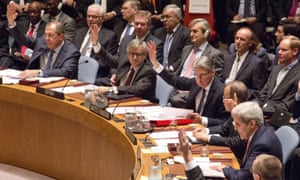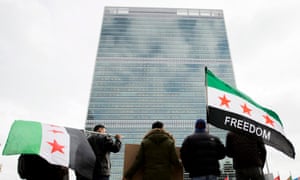
The security council votes at the United Nations. Photograph: Bebeto Matthews
The UN security council has unanimously agreed a resolution endorsing an international roadmap for a peace process in Syria, a rare show of unity among major powers on a conflict that has claimed more than 250,000 lives.
“This council is sending a clear message to all concerned that the time is now to stop the killing in Syria and lay the groundwork for a government that the long-suffering people of that battered land can support,” US secretary of state John Kerry told the 15-nation council after the vote.
The resolution came after Russia and the US clinched a deal on a text. The two powers have had very different views on what should happen in Syria, where Islamic State militants control considerable territory.
Kerry made clear that there were still differences on the future of Syrian presidentBashar al-Assad, a close ally of Russia and Iran. Western governments want him to be ousted. The resolution does not touch on the question of Assad’s fate.
“We are under no illusions about the obstacles that exist,” added Kerry. “There obviously remain sharp differences within the international community, especially about the future of President Assad.”
Russian foreign minister Sergei Lavrov said about the resolution: “This is a clear response to attempts to impose a solution from the outside on Syrians on any issues, including those regarding its president.”
French foreign minister Laurent Fabius said talks between the Syrian government and opposition would only succeed if there were “guarantees on the departure” of Assad.
Fabius said: “How could this man unite a people that he has in part massacred? The idea that he could once again stand for elections is unacceptable to us.”
The text called for the UN to present the council with options for monitoring a ceasefire within one month of adoption of the resolution. It also backed a timeline previously agreed in Vienna for talks between the government on a unity government and opposition, and eventual elections.

The talks between Syria’s government and opposition should begin in early January, the resolution said. It also endorsed the continued battle to defeat Isis.
The British foreign secretary, Philip Hammond, called the resolution a “significant step” towards ending the civil war. But he accepted that there was “still a very long way to go” and that the text failed to address what role Assad should play.
Britain remains insistent that Assad can remain in place temporarily as part of a transitional administration, but cannot have a long-term role in government.
Hammond said: “This process necessarily involves the departure of Bashar al-Assad, not only for moral reasons because of the destruction that he has unleashed on his own people, but also for practical reasons – because it will never be possible to bring peace and unity to Syria as long as he remains in office.
“But we must and will protect the institutions that are necessary for the future governance of Syria and that will be possible with a representative transitional governing body.”
Kerry praised “the unprecedented degree of unity” in the council, which has been stymied in the past over a political solution in Syria, and called the resolution a milestone.
Foreign ministers met for more than five hours on how to implement their call in Vienna last month for a ceasefire and the start of negotiations between the government and opposition in early January. At the same time, diplomats worked to overcome divisions on the text of the resolution.
The resulting agreement “gives the Syrian people a real choice, not between Assad and Daesh, but between war and peace”, Kerry said, using the Arabic acronym for Isis.
“We’re under no illusions about the obstacles that exist … especially about the future of President Assad” where “sharp differences” remain, Kerry said.
But he made clear that Assad must go if there is to be peace in Syria.
“Assad has lost the ability … to unite the country,” Kerry said. “If the war is to end, it is imperative that the Syrian people have to agree on an alternative” to their government.
[Source:- The Gurdian]
